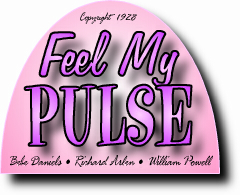

Paramount Pictures
Cast: Bebe Daniels (Barbara Manning), Richard Arlen (Wallace Roberts), William Powell (Phil Todd), Melbourne McDowell (Uncle Wilburforce Manning), George Irving (Uncle Edgar Manning), Charles Sellon (Sylvester Zilch, the caretaker), Heinie Conklin (Thirsty McGulp, the drunk)
When her father died, it was decided that the infant Barbara
Manning would be left in the care of her Uncle Edgar and should
lead a germ-proof life. At the age of 21, she would become the
responsibility of her Uncle Wilburforce. For the first 21 years
of her life, Uncle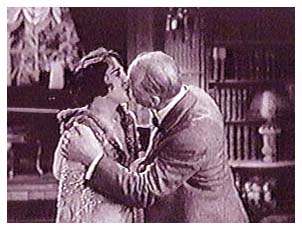 Edgar saw to it
that she was shielded from any germs and had a doctor and nurses
care for her around the clock. On her 21st birthday, Uncle Wilburforce
from Texas arrives and believes all the concern about her health
is ridiculous. He proves it by shouting and shooting a gun in
the house. Barbara and Uncle Edgar decide she should go some place
where Uncle Wilburforce can't find her, so she goes to a sanitarium
on a remote island that the family owns. However, it turns out
that the sanitarium has been taken over by rumrunners. She meets
a reporter there who is working undercover as a gang member and
also encounters the leader of the gang who pretends he is a doctor
and all his gang are patients in an effort to get her millions.
Hijackers attack the place, though, and, in the end, Barbara proves
she is not so fragile as she protects the reporter and herself
from the gang.
Edgar saw to it
that she was shielded from any germs and had a doctor and nurses
care for her around the clock. On her 21st birthday, Uncle Wilburforce
from Texas arrives and believes all the concern about her health
is ridiculous. He proves it by shouting and shooting a gun in
the house. Barbara and Uncle Edgar decide she should go some place
where Uncle Wilburforce can't find her, so she goes to a sanitarium
on a remote island that the family owns. However, it turns out
that the sanitarium has been taken over by rumrunners. She meets
a reporter there who is working undercover as a gang member and
also encounters the leader of the gang who pretends he is a doctor
and all his gang are patients in an effort to get her millions.
Hijackers attack the place, though, and, in the end, Barbara proves
she is not so fragile as she protects the reporter and herself
from the gang.
Everyone loves Bebe Daniels. She is best known to silent movie fans through the Harold Lloyd shorts of the 'teens and can be seen in supporting roles in such Cecil B. DeMille extravaganzas of the late 'teens and early twenties as "Male and Female" (1919), "Why Change Your Wife?" (1920) and "The Affairs of Anatol" (1921). But the DeMille pictures were not the only films she made for Paramount. Actually, she was in 51 films between 1919 and 1928, almost all being starring vehicles for the popular star. Unfortunately, only two of her films are readily available on video for the home viewer today -- "Miss Bluebeard" (1925), a wonderful bedroom farce that is almost stolen by the comedic antics of Raymond Griffith, and "Feel My Pulse" (1928), a very average comedy that draws considerably on the slapstick of over 10 years earlier.
The bottom line is that "Feel My Pulse" probably rates no more than a "5" on a scale of "10." It has some very humorous moments, but the overall story is episodic with scenes you would normally see thrown in to "pad" a comedy to feature length.
First of all, Bebe Daniels is beautiful and much more attractive
in "Feel My Pulse" than she was several years earlier
in the Lloyd shorts. She also should be credited with bringing
life to a story from which few stars could elicit a gasp. She
is animated, not a static figure on 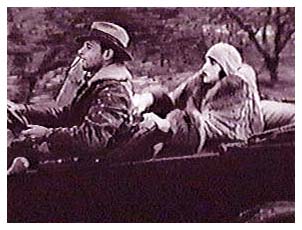 the screen,
still displaying one of the most expressive faces in silent movies.
Daniels is one of the few who could pull off a superior haughtiness
one moment, then dash off like an Olympic sprinter only to return
her composure and haughtiness as if the sprinter were another
person.
the screen,
still displaying one of the most expressive faces in silent movies.
Daniels is one of the few who could pull off a superior haughtiness
one moment, then dash off like an Olympic sprinter only to return
her composure and haughtiness as if the sprinter were another
person.
The scene where this happens is one of the best in the movie. Barbara is on her way to the remote sanitarium and has gotten into Wallace Roberts' (Richard Arlen) Model T thinking it is a taxi. Roberts is a reporter working undercover at the sanitarium as a member of a rum-running gang in order to get a story. When he arrives at the car and sees her seated in the back, he is puzzled. Barbara assumes a very superior tone and commands, "Boy, proceed to Destination Point." Wallace's reaction is "Lady, you need a closed car. You'll be safer from prowling squirrels." Unaffected by the young man's impertinence, she orders, "Do whatever one does to start this vehicle -- and let us away over hill and dale." Not realizing her ultimate goal is the sanitarium, he agrees to drive her to the dock. After a short distance of high speeds and innumerable bumps, she orders him to stop. She shakes the dust from her fur, pulls out her large medicine bag, sets it on the folded top at the back of the car and takes some pills. "I'm an invalid," she moans. "My heart can't stand the slightest exertion." He then starts the car again, and the medicine bag falls off in the road. When Barbara realizes what has happened, she leaps over the back of the still moving car, and runs at top speed down the road to recover her precious pills. Wallace looks back and is astonished at this display of athleticism. He backs the car down the road to retrieve her. "Where do you get this invalid stuff," he asks, "after that sprinting exhibition?"
This scene has some originality and is quite humorous. However, much of what follows at the so-called sanitarium owes a lot to Keystone and was "cliché" even by this time in movie history.
For example, when the caretaker learns that Barbara is on
her way to the sanitarium, he quickly has a room cleaned for her.
He takes her 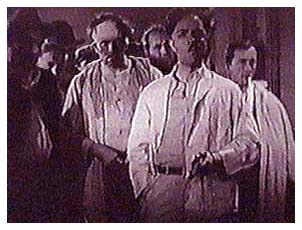 to the room and notices there is
still one small beer keg left. He tries to hide it from her by
first sitting on it, then lifting it behind his back and walking
backwards (as if she couldn't see what was behind his back!).
Finally, working his way over to the second story window, he drops
it, and the keg lands on two men below knocking them out.
to the room and notices there is
still one small beer keg left. He tries to hide it from her by
first sitting on it, then lifting it behind his back and walking
backwards (as if she couldn't see what was behind his back!).
Finally, working his way over to the second story window, he drops
it, and the keg lands on two men below knocking them out.
In another scene, gang leader Todd is giving Barbara a tour of the sanitarium. When he shows her a steam cabinet, he realizes that one of his gang is hiding inside, so he turns the heat full blast and locks the door. He and Barbara leave, and then we see two heads alternately popping up through the hole on top to gasp for air. Finally, the door bursts open and two men roll out gasping for breath.
One of the least original scenes comes toward the end when Barbara is at the head of the staircase trying to keep the gang at bay. She grabs everything she can to throw or roll down the stairs to ward them off -- mostly a large number of kegs and several glass bottles from a shelf in the upstairs hallway. Finally, she finds a rather large bottle of chloroform and throws it down the stairs. When the gang comes under the effects of the fumes, we suddenly see them all "floating around" in slow motion, dancing and prancing as if in a fairyland dream. Todd, the tough leader of the gang, prances around with a silly smile on his face and throws his gun in the air before falling to the floor, the smile still there. Very unoriginal.
Former Mack Sennett comedian Heinie Conklin brings in a
good performance as Thirsty McGulp, a member of the gang who is
constantly drunk and will drink anything to stay that way. Barbara
thinks he is a patient and offers him some of her medicine. Instead
of taking a spoonful, he downs the entire bottle. He offers her
some of his "medicine," which is actually a big bottle
of whiskey. At first, she pours a spoonful, but he tells her she
must take much more to feel the effects. Soon, both are drunk
and singing a duet of "My Sweet ADD-A-LINE." One of
the most humorous moments in this segment is when Conklin grabs
a large bottle of pills from Barbara's 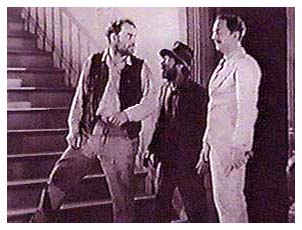 medicine
bag instead of a liquid. He turns the bottle up to his mouth taking
in a large portion of the contents. When he realizes it isn't
liquid, he spews a stream of pills from his mouth. Conklin redeems
what could have been a very humorless segment.
medicine
bag instead of a liquid. He turns the bottle up to his mouth taking
in a large portion of the contents. When he realizes it isn't
liquid, he spews a stream of pills from his mouth. Conklin redeems
what could have been a very humorless segment.
William Powell does a commendable job as the ruthless gang leader. He is a believable threat to both Wallace and Barbara and as the tough leader of the rumrunners. He struts around with a knife in his hand intimidating all of the gang members, and when he comes face to face with Wallace, the tension is intense. Powell is also effectively evil in the scene where he plans to seduce Barbara in her bedroom. No one will doubt Powell's acting abilities, not only in silents, but well into the sound era, as well. However, the acting required of him when under the effects of the chloroform and the manner of his eventual downfall are unworthy of this fine actor.
Richard Arlen does an effective job as the love interest and is very believable as an undercover reporter posing as a gang member. This is actually a good role for him that requires quite a bit of physical activity as he fights off the hijackers who have come to do battle with the rum-running gang. Arlen does it all well and is a welcome addition to the film.
The writers attempted to provide action in the story with two big battles between the hijackers and the gang, but both only appear as uncontrolled mayhem with no way to tell who is on what side. Besides, we really don't care who wins. Our only concern is that Wallace and Barbara escape. The writers did a good job of grabbing the viewer's interest when, just as we think the young couple are going to escape, Todd steps out from behind a tree with a gun forcing them back into the house. Unfortunately, they failed to sustain this interest as the Keystone-style silliness soon takes over.
Comments must be measured well in critiquing this film as
it does provide a moderate amount of enjoyment. It is, however,
a 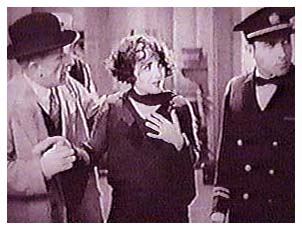 disappointment that with stars
of the caliber of Bebe Daniels, Richard Arlen and William Powell
that it isn't better than it is.
disappointment that with stars
of the caliber of Bebe Daniels, Richard Arlen and William Powell
that it isn't better than it is.
Variety (March 7, 1928) said the movie was "not as strong as some of this star's previous comedies and more given to snickers and light chuckles than successive laughs." The reviewer added, "Won't cause hysterics, but enough acting and comedy to get it by . . ." Praise was justifiably given to the titles, though. "Device of making Miss Daniels a much sterilized heiress of an anti-germ uncle, and the girl's wide range but most proper vocabulary is right in George Marion's lap. Titles help the pace and in odd instances solidly register."
The New York Times (March 4, 1928) reviewer said the movie "promises to be a good comedy at the start, but it soon slumps into an incoherent triviality." The actors were given praise in spite of a weak story. "Miss Daniels is at least energetic in her attempts to make this hectic array of scenes laughable. Richard Arlen and William Powell, in contrasting roles, serve this film as well as it is possible considering what they are called upon to do."